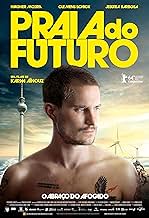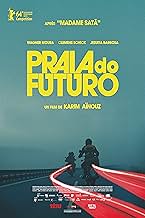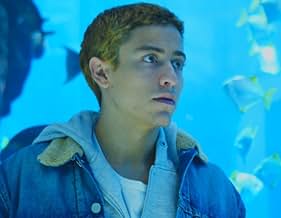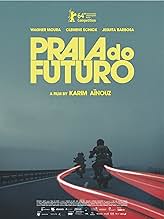CALIFICACIÓN DE IMDb
6.3/10
3.5 k
TU CALIFICACIÓN
Agrega una trama en tu idiomaShortly after failing to rescue a drowning man, Donato meets Konrad, a friend of the victim. They soon begin a relationship which seems doomed from the start, while Donato's past catches up ... Leer todoShortly after failing to rescue a drowning man, Donato meets Konrad, a friend of the victim. They soon begin a relationship which seems doomed from the start, while Donato's past catches up with him.Shortly after failing to rescue a drowning man, Donato meets Konrad, a friend of the victim. They soon begin a relationship which seems doomed from the start, while Donato's past catches up with him.
- Dirección
- Guionistas
- Elenco
- Premios
- 11 premios ganados y 20 nominaciones en total
Demick Lopes
- Capitão Motta
- (as Démick Lopes)
Yannik Burwiek
- Filho de Heiko
- (as Yannik Burwieck)
Jesuíta Barbosa
- Ayrton - 18 anos
- (as Jesuita Barbosa)
- Dirección
- Guionistas
- Todo el elenco y el equipo
- Producción, taquilla y más en IMDbPro
Opiniones destacadas
Donato (Wagner Moura -'Elite Squad') is a lifeguard at 'Praia do futuro' and gets called into action one day when two German tourists get into trouble in the turbulent surf. Donato is unable to save him but afterwards meets Konrad - this is the friend of the drowned man and he is gay - just like Donato.
Well one thing leads to another and they get romantically entwined. It is a relationship built on lust and though that can survive for a while it always seems doomed to failure. Whilst the inevitable catches up on the love front, Donato seems to have also, not run, but ambled away from his past and family. That is a past with a memory and it is just as inevitable that it too will catch up with him.
Now this is a very well made and observed film, with some stunning scenes and a confidence to know when to ramp up the ante and when to let it meander by in a pique of self absorption. There is a smattering of bedroom action, but simulated and nothing over the top. This is a relationship piece more than anything else and covers most of the bases. It has a full range of emotions too and reactions but approaches its subject from the view that there is essentially good in all of us. This is a film for those who want to be made to think and if that floats your boat then I think you will get a lot from this film.
Well one thing leads to another and they get romantically entwined. It is a relationship built on lust and though that can survive for a while it always seems doomed to failure. Whilst the inevitable catches up on the love front, Donato seems to have also, not run, but ambled away from his past and family. That is a past with a memory and it is just as inevitable that it too will catch up with him.
Now this is a very well made and observed film, with some stunning scenes and a confidence to know when to ramp up the ante and when to let it meander by in a pique of self absorption. There is a smattering of bedroom action, but simulated and nothing over the top. This is a relationship piece more than anything else and covers most of the bases. It has a full range of emotions too and reactions but approaches its subject from the view that there is essentially good in all of us. This is a film for those who want to be made to think and if that floats your boat then I think you will get a lot from this film.
An award-winning screenwriter once told me the secret to his success. It's knowing and never forgetting the essence of film (and this holds true for directors, actors, cinematographers, make-up artists, and production designers as well).
Simply put, "A movie is a story that's told with pictures. Pictures that move." Every line, every shot, every scene, every setting, every prop, should be informed by this.
Few films exemplify this as well as Karim Aïnouz' "Praia do Futuro." Ainouz has said, "For me film is time, space, and sound distilled in a moving image."
It's also, you can see clearly from this film, about bodies moving in time and space and within architecture.
(There's one memorable scene of muscular lifeguards training on the beach and then running into the sea that's right out of poet Walt Whitman's "I Sing the Body Electric.")
Every shot, every scene in this spare, visual style of storytelling is a work of art, which shouldn't be surprising as Ainouz came to film making in a roundabout way, leaving Fortaleza, Brazil (where the opening of "Praia do Futuro" is set) to study architecture in Brazil's futuristic capital, Brasilia. He then studied fine art in New York, took up painting and photography, only to finally study film in graduate school at NYU. He sees himself primarily as a visual artist.
This is a film about fear and courage, about risking it all. It's also about displacement and freedom. But, unlike Hollywood films, it never spells anything out. These ideas are dealt with elliptically and obliquely and usually through movement and visuals rather than through dialogue. The protagonists move through water and dance and speed-race motorcycles through breathtaking scenery and they make passionate, sensual love.
If you like things spelled out for you and wrapped up with a bow this is not the film for you. Much of what happens, happens off-screen. Characters don't talk about their feelings or reveal much through dialogue and the ending is cryptic. But pay attention: It's the visuals and motion and actions that reveal everything.
And about that ending--there is some actual "telling" rather than showing in the end (don't worry, it's not a spoiler) and it's so emblematic of the film I'll cite it here. As we see two motorcycles disappear into the gray mist on a twisting, turning German autobahn, Donato, in a voice-over, addresses his brother, the one he'd abandoned eight years earlier when he left Brazil for Germany.
"There are two types of fear and courage, Speed. I act as if there is no danger. But you know that everything is dangerous in this endless sea."
"Praia do Futuro" invites you to take a swim, take a risk, try your luck. It doesn't promise a happy ending, but it doesn't preclude one, either.
Simply put, "A movie is a story that's told with pictures. Pictures that move." Every line, every shot, every scene, every setting, every prop, should be informed by this.
Few films exemplify this as well as Karim Aïnouz' "Praia do Futuro." Ainouz has said, "For me film is time, space, and sound distilled in a moving image."
It's also, you can see clearly from this film, about bodies moving in time and space and within architecture.
(There's one memorable scene of muscular lifeguards training on the beach and then running into the sea that's right out of poet Walt Whitman's "I Sing the Body Electric.")
Every shot, every scene in this spare, visual style of storytelling is a work of art, which shouldn't be surprising as Ainouz came to film making in a roundabout way, leaving Fortaleza, Brazil (where the opening of "Praia do Futuro" is set) to study architecture in Brazil's futuristic capital, Brasilia. He then studied fine art in New York, took up painting and photography, only to finally study film in graduate school at NYU. He sees himself primarily as a visual artist.
This is a film about fear and courage, about risking it all. It's also about displacement and freedom. But, unlike Hollywood films, it never spells anything out. These ideas are dealt with elliptically and obliquely and usually through movement and visuals rather than through dialogue. The protagonists move through water and dance and speed-race motorcycles through breathtaking scenery and they make passionate, sensual love.
If you like things spelled out for you and wrapped up with a bow this is not the film for you. Much of what happens, happens off-screen. Characters don't talk about their feelings or reveal much through dialogue and the ending is cryptic. But pay attention: It's the visuals and motion and actions that reveal everything.
And about that ending--there is some actual "telling" rather than showing in the end (don't worry, it's not a spoiler) and it's so emblematic of the film I'll cite it here. As we see two motorcycles disappear into the gray mist on a twisting, turning German autobahn, Donato, in a voice-over, addresses his brother, the one he'd abandoned eight years earlier when he left Brazil for Germany.
"There are two types of fear and courage, Speed. I act as if there is no danger. But you know that everything is dangerous in this endless sea."
"Praia do Futuro" invites you to take a swim, take a risk, try your luck. It doesn't promise a happy ending, but it doesn't preclude one, either.
Actually, this movie does not bring anything new to the Brazilian cinema.
I found its story totally lame. What about this synopsis after all? And it solely relies on the (already-way-too-mainstream) shocking sexually-appealing feature.
Also, German seems like the easiest language to be learned by a regular Brazilian, as the confusing time line does not allow to understand how long the main character spends on Germany. Same for his young brother, for whom the language-learning process has - again - a lame explanation.
Score is 3 out of 10 just for the few nice shots, even though the slowness of this movie is definitely boring.
I found its story totally lame. What about this synopsis after all? And it solely relies on the (already-way-too-mainstream) shocking sexually-appealing feature.
Also, German seems like the easiest language to be learned by a regular Brazilian, as the confusing time line does not allow to understand how long the main character spends on Germany. Same for his young brother, for whom the language-learning process has - again - a lame explanation.
Score is 3 out of 10 just for the few nice shots, even though the slowness of this movie is definitely boring.
Rather introspective, this Brazilian/German film, with little plot and a lot of propositions easy to follow, but maybe not that easy to understand. The story centers on a safeguard attracted to a man he saves. They soon go for sex, softly depicted in the movie. Next they go to Germany, in a process of inner evolution for the Brazilian lead that may be difficult for the appetite of American audiences, little is spoken. A Brazilian like me does understand it better, for it's a dilemma most common for a man divided between its original family and a life he thinks ought to be better. The principals are the continuum of the film, both handsome, specially the well-built safeguard. It was already discussed that the word 'love' is not part of the plot. Not a single time it is mentioned they could experiment this sentiment to one another, and one will really have to speculate on which were the inner movements that made the Brazilian immigrate. Not an easy film, but I think it worth the effort. A trivia: in Brazil, where Wagner Moura is well known and the film went to commercial circuit, the sex scenes were a scandal. So much so that audiences where advertised in the tickets about the subject.
As beautiful a cinematic essay on the subject of fear as I've seen in a while, Karim Aïnouz's "Futuro Beach" manages to cover a plethora of fears common to the human condition - fear of solitude, fear of commitment, fear of rejection, fear of change, fear of death (hell, even fear of water is covered) – and the remarkable human ability to overcome them.
Donato (Wagner Moura) is a lifeguard at a Brazilian Beach who is only able to save one of two German tourists from drowning. Having never had to face death before, he reaches out to the surviving tourist Konrad (Clemens Schick) and soon finds himself in a complex relationship that leads him to question who he is and what he wants from life. Faced with making difficult choices, including the decision to abandon his younger brother and mother and relocate to Germany to join Konrad, Donato finds that his fears have followed him. Eventually isolating himself from Konrad and still unable to deal, he finds himself living a solitary life until he comes face-to-face with his past. Only then can he finally begin the journey of self-acceptance necessary to move beyond the fears that have held him back from experiencing a full life.
Cinematographer Ali Olay Gözkaya's stunning photography captures the natural beauty of the Brazilian and European locations and enhances the story's mood and tone. Performances are strong from the two principals and the two actors playing the younger brother Ayrton, ages 10 and 18 (Sávio Ygor Ramos and Jesuíta Barbosa,) also acquit themselves nicely. The scenes with the two brothers ably capture the special bond often shared between male siblings.
Often jumping from moments of quiet and solitude to scenes with pulsating sounds and action, "Futuro Beach" grabs you from its opening shots of motorcyclists dwarfed by the turbines of a wind farm to its concluding POV imagery of another motorcycle trek down an endless road at dusk. It excels at cinematically and dramatically capturing a snapshot of the often emotionally treacherous voyage that is life.
Donato (Wagner Moura) is a lifeguard at a Brazilian Beach who is only able to save one of two German tourists from drowning. Having never had to face death before, he reaches out to the surviving tourist Konrad (Clemens Schick) and soon finds himself in a complex relationship that leads him to question who he is and what he wants from life. Faced with making difficult choices, including the decision to abandon his younger brother and mother and relocate to Germany to join Konrad, Donato finds that his fears have followed him. Eventually isolating himself from Konrad and still unable to deal, he finds himself living a solitary life until he comes face-to-face with his past. Only then can he finally begin the journey of self-acceptance necessary to move beyond the fears that have held him back from experiencing a full life.
Cinematographer Ali Olay Gözkaya's stunning photography captures the natural beauty of the Brazilian and European locations and enhances the story's mood and tone. Performances are strong from the two principals and the two actors playing the younger brother Ayrton, ages 10 and 18 (Sávio Ygor Ramos and Jesuíta Barbosa,) also acquit themselves nicely. The scenes with the two brothers ably capture the special bond often shared between male siblings.
Often jumping from moments of quiet and solitude to scenes with pulsating sounds and action, "Futuro Beach" grabs you from its opening shots of motorcyclists dwarfed by the turbines of a wind farm to its concluding POV imagery of another motorcycle trek down an endless road at dusk. It excels at cinematically and dramatically capturing a snapshot of the often emotionally treacherous voyage that is life.
¿Sabías que…?
- TriviaAccording to Clemens Schick, he and Wagner Moura did not get along when they first met, but became close friends after filming their scenes.
- ErroresWhen Konrad drives around on a KTM in Germany, the motor noise you hear is clearly from a 4-in-a-row cylinders engine. But KTM only manufactures 1 and 2 cylinders motors that would never sound like this.
- Versiones alternativasThe first love scene in the film's Part II section (containing footage of oral sex being performed) was cut in the theatrical/home video release.
- Bandas sonorasHeroes
Written by David Bowie and Brian Eno
Selecciones populares
Inicia sesión para calificar y agrega a la lista de videos para obtener recomendaciones personalizadas
- How long is Futuro Beach?Con tecnología de Alexa
Detalles
- Fecha de lanzamiento
- Países de origen
- Sitios oficiales
- Idiomas
- También se conoce como
- Futuro Beach
- Locaciones de filmación
- Productoras
- Ver más créditos de la compañía en IMDbPro
Taquilla
- Presupuesto
- USD 4,000,000 (estimado)
- Total en EE. UU. y Canadá
- USD 20,262
- Fin de semana de estreno en EE. UU. y Canadá
- USD 3,324
- 1 mar 2015
- Total a nivel mundial
- USD 779,835
- Tiempo de ejecución1 hora 46 minutos
- Color
- Relación de aspecto
- 2.35 : 1
Contribuir a esta página
Sugiere una edición o agrega el contenido que falta

Principales brechas de datos
By what name was Praia do Futuro (2014) officially released in Canada in English?
Responda
























